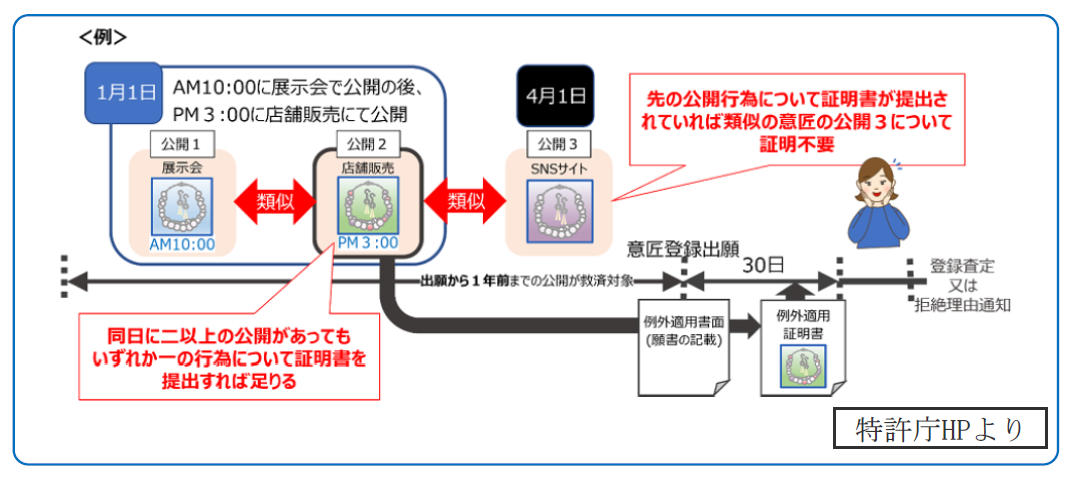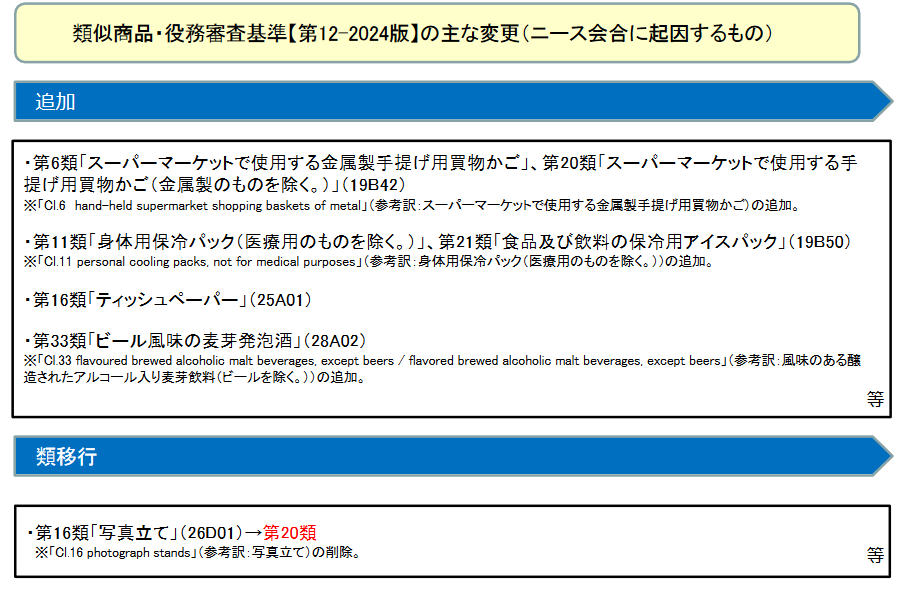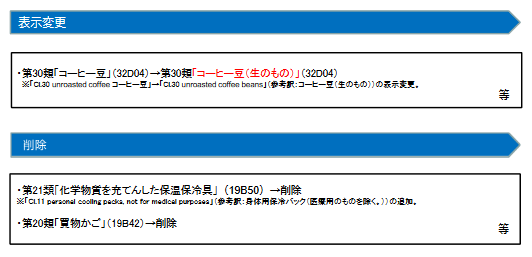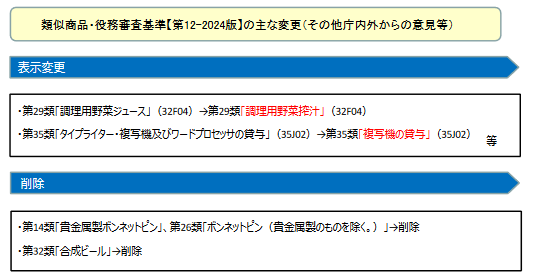目次
1月号【法務】ニュースレター

2024年1月1日に施行
新規性喪失の例外適用手続の緩和
当所ニュースレターでお伝えしてきた「意匠の新規性喪失の例外適用手続の緩和」についての改正が、2024年1月1日に施行されることになった。
この日以後の出願については、意匠登録を受ける権利を有する者(権利の承継人も含む)の行為に起因して公開された意匠について、最先の公開日のいずれかの公開行為(同日であれば時間の先後は問われない)について証明することによって、最先の公開日以後に公開した同一又は類似の意匠についても、手続きすることなく新規性喪失の例外規定の適用が受けられるようになる。
具体的な運用については、「意匠審査基準」及び「意匠の新規性喪失の例外規定(意匠法第4条第2項)についてのQ&A集」等が順次改訂され、公表される予定だ。

「音声合成AI利用における声の著作権
2023年10月23日、情報処理学会コンピュータセキュリティシンポジウム2023論文集でNTT社会情報研究所が慶応義塾大学大学院政策・メディア研究科に所属する研究者と「音声合成AIの利用場面における法的課題―「声」に権利はあるのか―」を出稿した。AIによる音声合成技術で生成された、実在する人間の声と酷似した合成音声が利用される場面が今後想定されることにともない、その際主張できる権利について、著作権、パブリシティ権、個人情報保護法の観点から検討している。
著作権については、例えば誰もが知る俳優がSNSに動画を投稿した場合、その動画は本人の思想又は感情を創作的に表現した著作物である。そして、動画に含まれる音声だけを本人に無断で抽出してAIによって音声合成モデルを作成する行為自体は、著作物に表現された思想や感情の享受を目的としない情報解析研究の利用に該当するため著作権者の権利が制限される可能性がある(著作権法第三十条の四第2号)。ただし、俳優の声を再現する目的で音声合成モデルのみを使用する場合は、著作物の種類及び用途並びに当該利用の態様に照らし著作権者の利用を不当に害することとなり著作権侵害を主張できるとしている。
いずれにしても音声合成AIの利用場面における「声の権利」についての概念が確立されるまでは、著作権者の許諾を得ることが重要だ。
特許庁、類似商品・役務審査基準〔国際分類第12-2024版対応〕を公表
特許庁は、類似関係にあると推定する商品又は役務をグルーピングし、各グループに検索のための特定のコードを付与した「類似商品・役務審査基準」(以下「類似基準」という。)を作成、公表している。
この「類似基準」は、商標法第4条第1項第11号の規定に基づき、商標登録出願の指定商品又は指定役務が他人の商標登録の指定商品又は指定役務と類似関係にあるか否かを審査官が判断するための統一的基準として機能しているところ、今般(2023年12月8日)、特許庁は、類似商品・役務審査基準〔国際分類第12-2024版対応〕を公表した。
本類似基準は、2024年1月1日から適用される。
主な変更点は以下。



このほか、追加・削除・表示変更された商品・役務は変更点一覧で確認できる。URL:https://www.jpo.go.jp/system/laws/rule/guideline/trademark/ruiji_kijun/document/ruiji_kijun12-2024/henkouten_ichiran.pdf
[参照]
https://www.jpo.go.jp/system/laws/rule/guideline/trademark/ruiji_kijun/ruiji_kijun12-2024.html
Newsletter translated into English

Relaxation of Procedures for Exception to Lack of Novelty
(Enacted on January 1, 2024)
The amendment to “Relaxation of Procedures for Exception to Lack of Novelty of Design” which we have reported in our previous newsletters will come into force on January 1, 2024. For applications filed on or after January 1, 2024, with respect to a design published due to action by a person who has the right to obtain a registration for said design (including successors of the right), the same or similar designs which were published on or after the earliest publication date may also receive an exception to lack of novelty without need for additional procedures, by providing proof of any act of publication that took place on the earliest date of publication (if more than one publication took place on the same day, the specific timing of the publications does not matter).
The “Design Examination Guidelines” and the “Collection of Questions and Answers on Exceptions to Lack of Novelty of Designs (Article 4(2) of the Design Act)” will be revised and published in due course.

Copyright of Voice in the Use of Speech Synthesis AI
On October 23, 2023, NTT Socio-Informatics Research Laboratories, together with researchers affiliated with the Graduate School of Media and Governance of Keio University, submitted a paper entitled “Legal Issues in the Use of Speech Synthesis AI: Do We Have Rights to ‘Voices’?”. The article examines the rights that can be asserted in the future use of synthetic voices that closely resemble real human voices, generated by AI voice synthesis technology, from the perspective of copyright, right of publicity, and personal information protection law.
With regard to copyright, for example, when a well-known actor posts a video on a social networking service, the video is a work that creatively expresses his/her thoughts or feelings. And the act of extracting only the voice contained in the video without the actor’s permission and creating a text-to-speech model using AI itself may fall under the use of information analysis research that does not aim to enjoy the thoughts and feelings expressed in the work, and thus the copyright holder’s rights may be restricted (Article 30-4-2 of the Copyright Act). However, if only a speech synthesis model is used for the purpose of reproducing an actor’s voice, the copyright owner can claim copyright infringement because the use is unreasonably prejudicial to the copyright owner’s use in light of the type and intended use of the copyrighted work and the manner of such use.
In any case, until the concept of “voice rights” in the use of speech synthesis AI is established, it is important to obtain the permission of the copyright holder.
JPO Publishes Examination Guidelines for Similar Goods and Services
(International Classification of Goods and Services, Edition 12-2024)
The JPO has prepared and published the “Examination Criteria for Similar Goods and Services” (hereinafter referred to as the “similarity criteria”), in which goods or services that are presumed to be similar are grouped together and each group is assigned a specific code for search purposes. The “similarity criteria” are based on the Trademark Law and the Trademark Law.
These “similarity criteria” function as uniform criteria for examiners to determine whether the designated goods or designated services of an application for trademark registration are similar to the designated goods or designated services of another person’s trademark registration, in accordance with Article 4(1)(xi) of the Trademark Law. On December 8, 2023, the JPO published the Examination Guidelines for Similar Goods and Services (corresponding to the International Classification of Goods and Services Version 12-2024).
These similarity criteria will be applied from January 1, 2024.
The main changes are as follows



Other goods and services that have been added, deleted, or changed in the display can be found in the list of changes (URL: https://www.jpo.go.jp/system/laws/rule/guideline/trademark/ruiji_kijun/document/ruiji_kijun12-2024/henkouten_ichiran.pdf).
[See also]
https://www.jpo.go.jp/system/laws/rule/guideline/trademark/ruiji_kijun/ruiji_kijun12-2024.html

